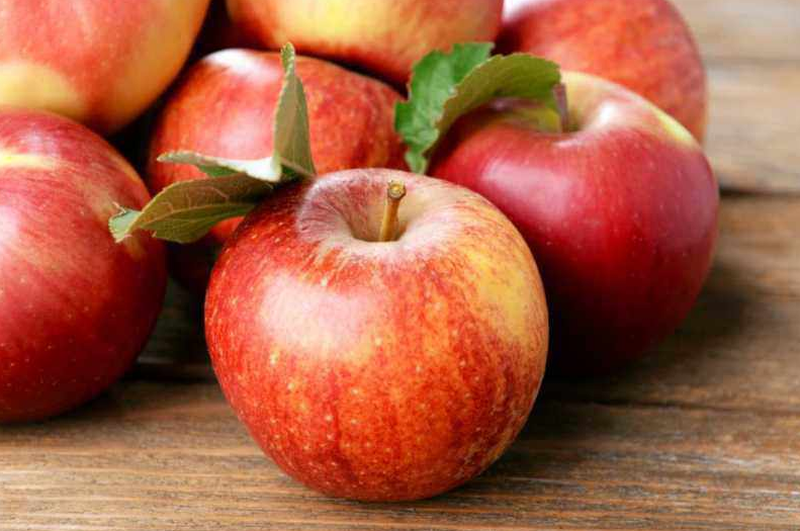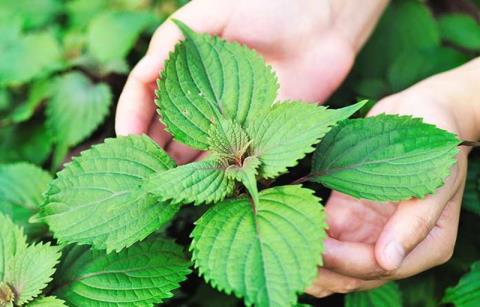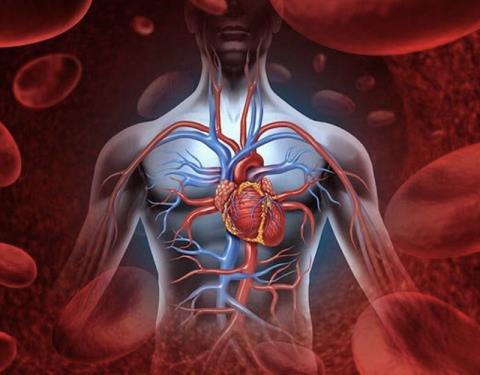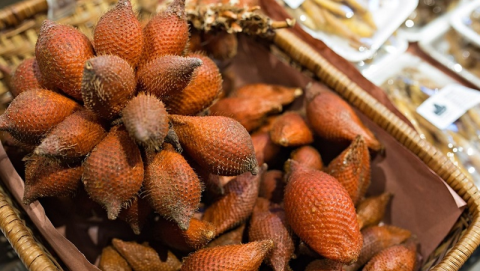Although fruit allergies are uncommon and have relatively mild symptoms, anaphylaxis can be life-threatening. People with frequent fruit allergies should learn which fruits to eat or avoid.
When a substance comes into contact with or enters the body, the immune system responds with an allergic reaction. Possible allergens include food, dust, pollen, and chemicals. Fruit allergies are uncommon, but caution should still be exercised. Below is information about the symptoms, diagnosis and treatment of fruit allergy that you can refer to.
Overview of fruit allergies
Why is there a fruit allergy?
 Apple is one of the fruits that can cause allergies
Apple is one of the fruits that can cause allergies
Signs of a fruit allergy are often associated with oral allergy syndrome (OAS). Because the body's immune system mistakes ingredients in food as harmful, it overreacts to these ingredients with an allergic reaction. Allergic reactions cause the body to release certain substances such as histamine, which can cause allergy symptoms. Allergic reactions to foods can range from unpleasant to severe, even life-threatening.
Here are the pollens and related fruits that can trigger OAS syndrome:
- Birch Pollen: Apricots, apples, pears, cherries, kiwis, peaches, and plums.
- Grass pollen: Orange, melon.
- Ragweed Pollen: Melon, banana.
- Wormwood Pollen: Peach.
In addition to general fruit allergies, some people may experience an allergic reaction to compounds in peaches, apricots, and plums. Usually allergy symptoms involve only the gastrointestinal tract, but in some cases allergies have systemic symptoms, which can affect the body's tissues and organs. In rare cases, ingestion of these fruits can cause anaphylaxis .
Signs of a fruit allergy
Oral allergy syndrome and fruit allergy can cause symptoms ranging from uncomfortable to severe, even life-threatening. Symptoms of a fruit allergy include:
- Itching or tingling in the mouth.
- Swelling of the tongue, throat, and lips.
- Sneezing and stuffy nose.
- Feeling lightheaded.
- Nausea.
- Stomach-ache.
- Diarrhea . _
In some cases, people with allergies can experience anaphylaxis, which is a serious, life-threatening reaction. Go to the hospital right away if you experience any of the following:
- Quinsy.
- Airway constriction.
- Fast pulse.
- Dizzy.
- Loss of consciousness.
- Low blood pressure .
- Anaphylaxis.
Sneezing and stuffy nose are common symptoms of allergies
Fruit allergy or food intolerance?
For many people, a reaction to a food is sometimes not an allergy but rather a food intolerance. Because food allergies and food intolerances often have similar symptoms and manifestations, people are sometimes confused. There is actually a difference between a food allergy and a food intolerance.
Factors that can cause food intolerance include:
- Irritable bowel syndrome (IBS).
- Lactose intolerance.
- Gluten sensitivity (not due to Celiac disease).
- Food additives (such as sulfites) are used to preserve dried fruit.
- Psychological factors.
The cause of food intolerance is usually the patient's sensitivity to the natural chemicals found in a fruit. Sometimes, the condition is caused by the body's inability to digest the natural sugar (fructose) found in fruit. See your doctor for an examination and diagnosis if you suspect you may have one of these conditions.
How to diagnose and treat a fruit allergy?
How to diagnose?
If you eat a certain fruit and have symptoms of an allergic reaction, contact an allergist for an examination and diagnosis, including:
- Consider suspicious factors and symptoms.
- Review your and your family's allergy history.
- Physical examination.
- Use a skin prick test with a variety of fruits.
- Blood analysis to look for Immunoglobulin E (IgE) antibodies associated with allergies.
- Test and evaluate the patient's allergic reaction to eating different fruits.
In general, there are many diagnostic tests to help your doctor determine if you have oral allergy syndrome (OAS) or food intolerance. After a successful diagnosis, your doctor can recommend treatment options and ways to prevent future allergies. In some cases, it is best to avoid eating fruits that make you sensitive or difficult to tolerate.
 Drinking ginger water helps improve the condition of itchy rashes when having food allergies
Drinking ginger water helps improve the condition of itchy rashes when having food allergies
Timely handling
If you have a fruit allergy, you should promptly handle it by following some steps:
- Immediately stop the fruit you are using and do not continue to eat the suspected allergy fruit.
- If you only have itchy, uncomfortable rashes, you can use medicine for people with food allergies such as antihistamines as prescribed by your doctor.
- If the allergic condition does not improve in severe cases, quickly go to the hospital in time. Your doctor can inject epinephrine and perform the two usual treatments, oral immunotherapy or Anti-ige.
- In case of anaphylaxis and fainting, the patient should be given artificial respiration and heart massage before being taken to the nearest emergency room.
Besides, you can apply some folk remedies to treat allergies such as:
- Drinking apple cider vinegar has an anti-histamine effect and restores the immune system, increasing the ability to absorb nutrients.
- Drinking ginger water helps reduce itchy rashes , skin rashes and improves digestion.
- Aloe vera gel helps to soothe burning, itchy rashes on irritated skin.
- Pregnant women with food allergies apply betel leaves to help prevent skin rashes.
- Chew raw garlic to improve allergies, increase resistance. However, you should not eat raw garlic on an empty stomach, leading to intestinal disorders.
In general, cases of fruit allergies are not common, but people with allergies should also be cautious. If you have ever had the above-mentioned fruit allergy symptoms, you should see your doctor for preventive measures and treatment, to avoid falling into a serious allergic situation, which is dangerous to your health.


 Apple is one of the fruits that can cause allergies
Apple is one of the fruits that can cause allergies Drinking ginger water helps improve the condition of itchy rashes when having food allergies
Drinking ginger water helps improve the condition of itchy rashes when having food allergies







